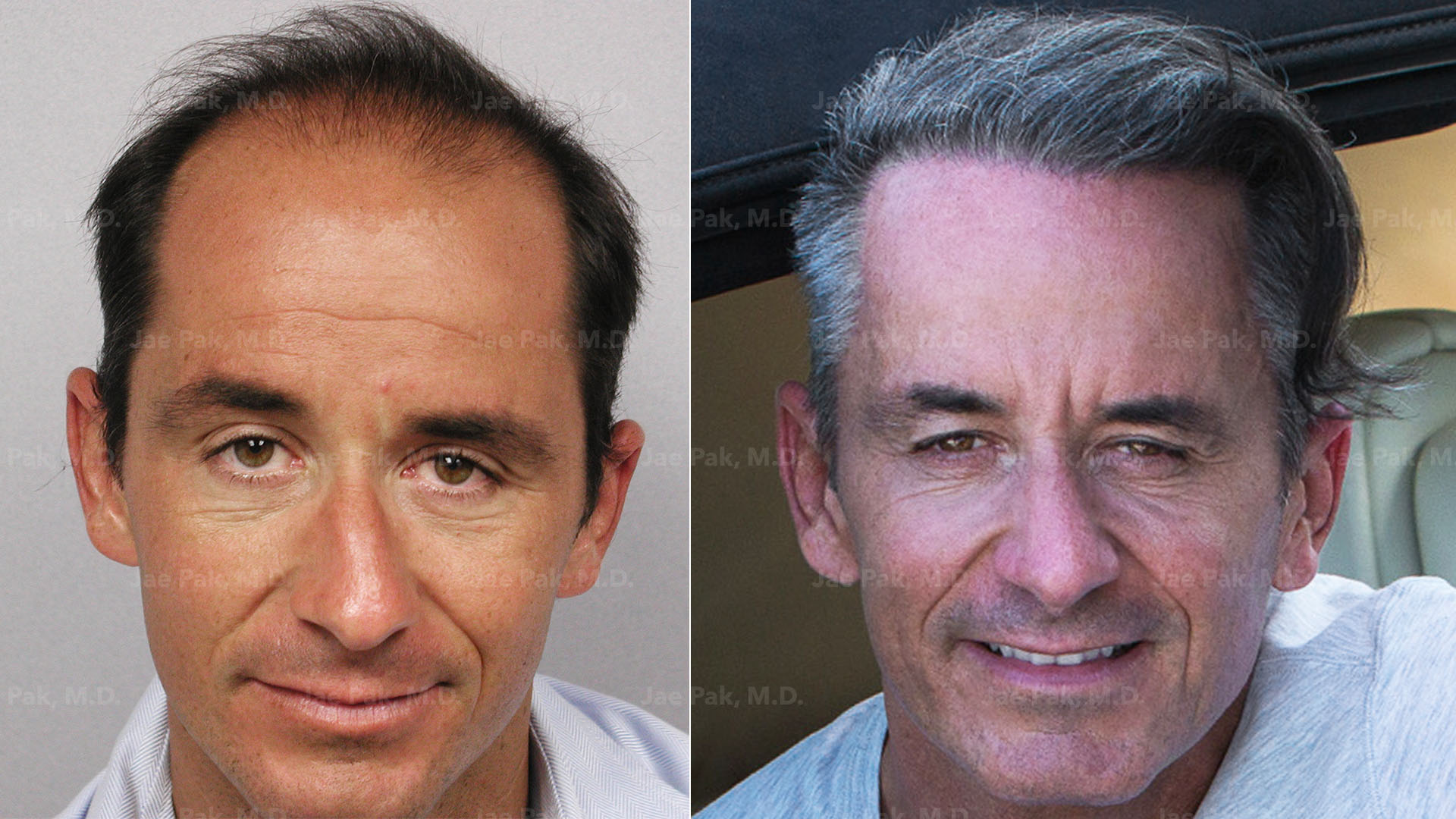
Many of those with hair loss experience anxiety, self-doubt, and other issues related to balding or a receding hairline. While these people may be interested in taking action, many of them are turned off by the prospect of having to wear a wig every day or of other temporary “solutions.” “This is part of the reason why hair transplants are so great,” said Dr. Pak of Jae Pak MD Medical “It’s a permanent solution that looks incredibly natural.”
Follicular transplantation is the technical name for what hair doctors or surgeons do for their patients. While there is more than one type of follicular transplantation, the idea behind both is the same: Doctors take individual hairs (hair plugs) or hair grafts of healthy hair from the back and sides of the scalp and transplant it into areas that are balding with surgical hair restoration. While the transplanted hair will fall out within a few weeks, the good thing is that your balding scalp is now “seeded” in the donor area, meaning in the months that follow you will notice healthy new hairs springing up in places that may not have seen life in years or even perhaps even decades after the surgical procedure. This is your new, permanent and natural hair.
There are two hair transplant procedures: Follicular Unit Transplantation (FUT) and Follicular Unit Extraction (FUE). Both methods produce permanent results that last a lifetime.
Many interested in hair transplantation are surprised when their doctor tells them that the goal of the surgery is to restore their natural hair and give them a permanent solution. Some seem to think that hair transplants are only a small step above wearing a wig. This, of course, is not the case. Hair restoration procedures offer patients a long-term durable solution that is just as robust and natural-looking as their real hair.
Specifically, whether a hair transplant candidate is advised to go with a FUT or FUE transplant depends on his or her individual circumstances, budget, and desired future look. A qualified and experienced surgeon will take all of these factors and more into account when coming up with his or her recommendations.
While hair loss treatments and hair restoration techniques can have very serious results, they are minor in terms of recovery time and side effects. Many patients are able to resume a normal life within a day. Also, if you go with the FUT hair procedure, you will not even need to worry about shaving the back and sides of your head, so the surgery is almost completely incognito, other than the fact that you will suddenly have a thick, healthy-looking head of hair!
When it comes to cosmetic surgeries like hair transplants, it is incredibly important to do your research on potential doctors or surgeons. The difference between an inexperienced surgeon versus a long-term one can have a dramatic impact on the outcome of your procedure. The thing patients must understand is that, experienced or not, if a doctor is trained and certified to do hair loss procedures, it means that they are likely capable of doing them. That does not, however, mean that he or she can do them well. Not all hair transplant surgeries are alike, for example like heart surgeries where surgeons are largely graded on a pass-fail. If a heart surgeon passes the patient lives, and if he or she fails, the patient dies. With hair surgeries, on the other hand, there are many grey areas where the surgery may technically have been a success, but where the patient is still unhappy and still experiences some baldness. This is where artistry and taste matter. Doctor Jae Pak is not only medically and technically qualified, but he also has years of experience with a great artistic eye for aesthetics.
Not everyone is a good candidate for a hair transplant. Here are some things to consider:
While hair transplants last a lifetime, this does not necessarily mean that getting a hair transplant is a one-off procedure. Why? Because while your transplanted hair is permanent and loss-resistant, that does not mean the surrounding hair can not thin and eventually fall out. If you have some areas on your head that are bald (donor area) and others that are thinning, this is fine, and you can work on the balding areas first and then, eventually, if the thinning areas on your scalp fall out completely, then you can replace them too. Using this triage method is also sometimes useful from a financial standpoint as it can take years for thinning hair to fall out completely. So if you take care of your immediate balding concerns first, and then wait for the rest, you do not have to shoulder the costs all at once.
After a hair transplant procedure, most patients will see results in three to six months, although for some, it can take up to a year. It is important for patients to realize that the donor hair, which is initially planted into the bald area of their scalp, falls out within a few weeks. This hair is not meant to be permanent; its function is to “seed” the bald area of the scalp and to catalyze new, healthy hair growth. Those results, as mentioned, will take several months to appear. But, once they do, they are permanent and healthy as the hair you had when you were a kid!
You now know that yes, hair transplants are indeed permanent and that they can take several months to fully set in.
Speak with Jae Pak, M.D. today!
Request a Consultation